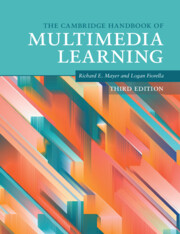Book contents
- The Cambridge Handbook of Multimedia Learning
- The Cambridge Handbook of Multimedia Learning
- Copyright page
- Contents
- Figures
- Tables
- Contributors
- Preface
- Acknowledgments
- Part I Background
- Part II Theoretical Foundations
- Part III Basic Principles of Multimedia Learning
- Part IV Principles for Reducing Extraneous Processing in Multimedia Learning
- 14 Principles for Reducing Extraneous Processing in Multimedia Learning
- 15 The Split-Attention Principle in Multimedia Learning
- 16 The Redundancy Principle in Multimedia Learning
- 17 The Signaling (or Cueing) Principle in Multimedia Learning
- 18 The Worked Example Principle in Multimedia Learning
- Part V Principles for Managing Essential Processing in Multimedia Learning
- Part VI Principles Based on Social and Affective Features of Multimedia Learning
- Part VII Principles Based on Generative Activity in Multimedia Learning
- Part VIII Multimedia Learning with Media
- Author Index
- Subject Index
- References
18 - The Worked Example Principle in Multimedia Learning
from Part IV - Principles for Reducing Extraneous Processing in Multimedia Learning
Published online by Cambridge University Press: 19 November 2021
- The Cambridge Handbook of Multimedia Learning
- The Cambridge Handbook of Multimedia Learning
- Copyright page
- Contents
- Figures
- Tables
- Contributors
- Preface
- Acknowledgments
- Part I Background
- Part II Theoretical Foundations
- Part III Basic Principles of Multimedia Learning
- Part IV Principles for Reducing Extraneous Processing in Multimedia Learning
- 14 Principles for Reducing Extraneous Processing in Multimedia Learning
- 15 The Split-Attention Principle in Multimedia Learning
- 16 The Redundancy Principle in Multimedia Learning
- 17 The Signaling (or Cueing) Principle in Multimedia Learning
- 18 The Worked Example Principle in Multimedia Learning
- Part V Principles for Managing Essential Processing in Multimedia Learning
- Part VI Principles Based on Social and Affective Features of Multimedia Learning
- Part VII Principles Based on Generative Activity in Multimedia Learning
- Part VIII Multimedia Learning with Media
- Author Index
- Subject Index
- References
Summary
This chapter outlines the tight connections between multimedia learning and worked examples in that worked examples can make multimedia learning more effective, and applying instructional multimedia guidelines makes learning from worked examples more effective. The to-be-expected effect sizes when using worked examples are discussed, and the theoretical rationale of the worked-example effect is explained (e.g., example study replaces unproductive learning by problem-solving). In addition, a set of instructional guidelines for optimizing learning from worked examples is derived from findings on factors that moderate the worked-example effect, such as fading worked steps or including incorrectly worked examples. Furthermore, the theoretical implications of the general pattern of findings on worked examples are discussed (e.g., with respect to the role of generative learning or extraneous processing). Finally, important questions to be addressed in further research are proposed.
Keywords
- Type
- Chapter
- Information
- The Cambridge Handbook of Multimedia Learning , pp. 231 - 240Publisher: Cambridge University PressPrint publication year: 2021
References
- 7
- Cited by

